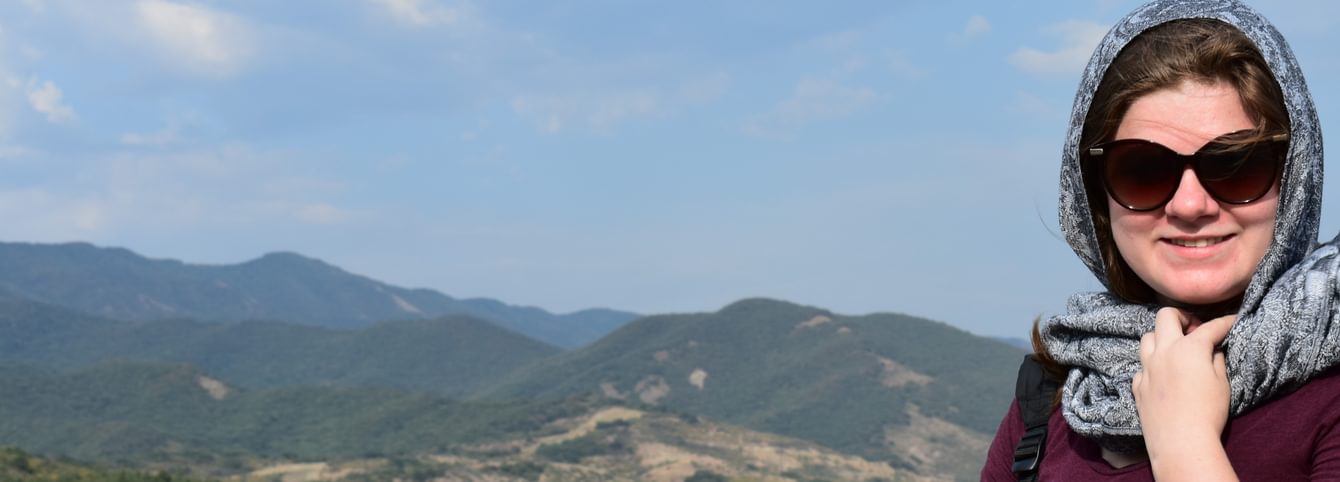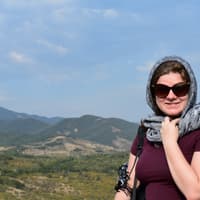Kaitlyn Johnson
Kaitlyn Johnson is an alumna of the 2019 CLS Russian program in Tbilisi, Georgia. She’s currently working toward a Master of Science in Foreign Service at Georgetown University and is a research assistant at the U.S. Institute of Peace. Kaitlyn plans to work in government or think tanks to analyze US foreign policy toward Russia, Eastern Europe, and Central Asia. She loves to write, travel and take photographs in her free time.
Inspiring Language Study
I was born and raised in Lawrence, Kansas, a college town about an hour outside Kansas City. As the oldest of four, I know that the path I choose and the values I highlight make an impact on my younger siblings. I was the first one in my family to study a language other than Spanish or French and was the first to study abroad. My sister is studying Arabic in Amman, Jordan and my brother also expects to pursue a less commonly taught language in college. Coming from a monolingual family, learning a new language sometimes felt impossible, especially when I compared myself with friends from recently immigrated families. I used to think about multilingualism not as a skill or a set of knowledge, but rather as a superpower. However, through my study of Russian, I have proven not only to myself, but also to my siblings, that anyone who is willing to put in the work can reach their language goals.
Why Russian?
My professional goals, to work in the foreign policy sphere, would be impossible to attain without a solid grounding in Russian language. When working with US-Russian policy, for instance, if you only speak English (or only speak Russian) you are only able to access half the sources. You are only getting half the story. Without being able to access source materials in the original Russian, I would lack an important perspective and be unable to fully understand the impact of our policies and options moving forward.
As US-Russia relations become increasingly tense, we are more and more in need of people who speak Russian, without whom there is no way to talk through these rising differences and it becomes more difficult to resolve political problems. In addition, there are so many people who speak Russian across such a vast expanse of land! Whether you want to work and/or travel in Ukraine, Georgia, Tajikistan, or on the far border of North Korea, you will be able to find Russian speakers all the way from Eastern Europe to the Pacific Ocean. It is in the top ten most common native languages, and many in the region speak it as a second language. Speaking Russian is really a passport to a huge chunk of the world.
Becoming Family
I looked forward every day to the moment I walked in the door of my host family’s house, coming home from class. Eliya, who had his first birthday the day after my arrival in Tbilisi, was usually sitting in his pack-and-play when I came in, and would stand up with the biggest smile and shout my arrival to the house. “Katya! Katya!” When he yelled, my host mother would come out of the kitchen, asking me how school was and, in true Georgian fashion, offering me more food than I could possibly eat. There’s no single day or story that stands out because after a little while, it’s just like being home. It’s not like travel where it’s just one experience after another and everything makes you feel like a tourist. My experience on CLS was a long, slow settling in. Settling into a routine, into a family, into a language, and into a different way of life. My homecoming each day was a reminder that, I felt as much at home with my host family as they did me. There were days when I struggled, but it was always nice to feel like I was surrounded by people who grew to love me and whom I grew to love.

Near the end of my program, I cooked some traditional American dishes for my host family. I spent eight hours making chili from my father’s recipe, explaining to my host mother how every American family has their own way to cook it, and it’s a staple where I’m from. She recognized it from a cooking show and told me she had been meaning to try it out and was eager to see how I made it. She and my host father loved the chili and ate two bowls each. We sat over dinner talking late into the night in Russian. When I returned home, food also served a role in bringing Georgian culture to my friends. As they were eager to hear about my summer, I invited them to a Georgian restaurant in DC and we talked about Georgia, from people to politics, while we shared khinkali and khachapuri.
Feeling the Support of CLS
One of my favorite things about CLS is that, since it is free to participants, the program is designed to help you achieving your language goals, without the distraction of financial motivations. This is not the first study abroad program I have participated in, but it is the first where I felt fully supported in reaching my own targets. If you can think of a way to improve your language learning, they will try to help make it happen. I was skeptical when I first saw that the program is only two months, but I improved more than I ever imagined I could due to the student-oriented structure.



